Great Bear Drills New High-Grade Gold Discovery at Dixie:
12.33 g/t Gold Over 14.00 m Including 30.90 g/t Gold Over 4.60 m;
194.21 g/t Gold Over 2.00 m Including 759.38 g/t Gold Over 0.50 m
Multiple Shallow Gold Zones at New “Bear-Rimini” Target
May 28, 2019 – Vancouver, British Columbia, Canada – Great Bear Resources Ltd. (the "Company" or "Great Bear", TSX-V: GBR) today reported a significant new high-grade gold discovery, the “Bear-Rimini Zone”, at its 100% owned Dixie Project in the Red Lake District of Ontario. Highlighted assay results from discovery drill hole DNW-011 are provided in Table 1.
Table 1: Highlighted results from discovery drill hole DNW-011 into the Bear-Rimini Zone.
| Drill Hole | From
(m) |
To
(m) |
Width*
(m) |
Width
(ft) |
Gold
(g/t) |
Gold
(oz/t) |
Vertical Depth
(m) |
|
| DNW-011 | 58.00 | 60.00 | 2.00 | 6.56 | 194.21 | 6.24 | 53 | |
| including | 58.00 | 58.50 | 0.50 | 1.64 | 759.38 | 24.42 | ||
| 58.50 | 60.00 | 1.50 | 4.92 | 5.81 | 0.19 | |||
| and | 75.00 | 89.00 | 14.00 | 45.93 | 12.33 | 0.40 | 71 | |
| 75.95 | 76.45 | 0.50 | 1.64 | 19.33 | 0.62 | |||
| including | 75.95 | 80.55 | 4.60 | 15.09 | 30.90 | 0.99 | ||
| and including | 78.45 | 80.55 | 2.10 | 6.89 | 60.27 | 1.94 | ||
| and including | 78.45 | 79.55 | 1.10 | 3.61 | 98.78 | 3.18 | ||
| and including | 78.95 | 79.55 | 0.60 | 1.97 | 130.97 | 4.21 | ||
| and including | 80.55 | 88.00 | 7.45 | 24.44 | 0.23 | 0.01 | ||
| and including | 88.00 | 89.00 | 1.00 | 3.28 | 27.15 | 0.87 | 81 | |
| and | 119.00 | 169.60 | 50.60 | 166.01 | 0.74 | 0.02 | 108 |
*All widths are drill indicated core length as insufficient drilling has been completed to determine true width at this time.
Highlights of Great Bear’s most recent discovery include:
- The Bear-Rimini Zone is located 2.5 kilometres northwest of the Hinge Zone.
- The new discovery is hosted by a new exploration target, the “LP Fault”, and adjacent lithologies. Airborne geophysics completed by Great Bear shows the LP Fault and a parallel structure, the “North Fault”, are interpreted to transect the property for 18 kilometres of strike length as shown on Figure 1.
- DNW-011 intersected intervals of gold mineralization across 110 metres of core length and were strongest in a coarse quartz crystal lapilli tuff unit in the northern footwall of the fault. This is the first drill hole in the project’s history to target this tuff unit. Complete assays from DNW-011 are provided in Table 2 at the end of this release.
- The LP Fault is interpreted as a major gold mineralization control and hydrothermal fluid conduit during Archean age gold mineralization. The generally 1 kilometre wide area between the LP and North Faults may represent a significant structural dilation zone where gold rich hydrothermal fluids accumulated.
- The LP Fault has a projected depth of 14 kilometres, extending to base of the continental crust/upper mantle as defined by the Lithoprobe Survey of the Red Lake district, as shown on Figure 2. A similar deep-seated structural feature was interpreted by the Survey to be spatially and genetically associated with the majority of gold mineralization along the main Red Lake mine trend (Zeng and Calvert, 2006) where over 30,000,000 ounces of gold have been produced.
- The LP Fault parallels highway 105, the main access corridor to Red Lake and is 1 to 3 kilometres from a powerline and paved road, and it is a 30 minute drive from the main Red Lake gold mine operated by Newmont Goldcorp Corp.
Figure 1: Map of the Dixie project showing the location of known gold zones (DHZ, DL, DNW and DNE) and current drill results. The location of the LP Fault drilled in DNW-011 is shown in red dashes. The Bear-Rimini Zone is labelled “BR”.
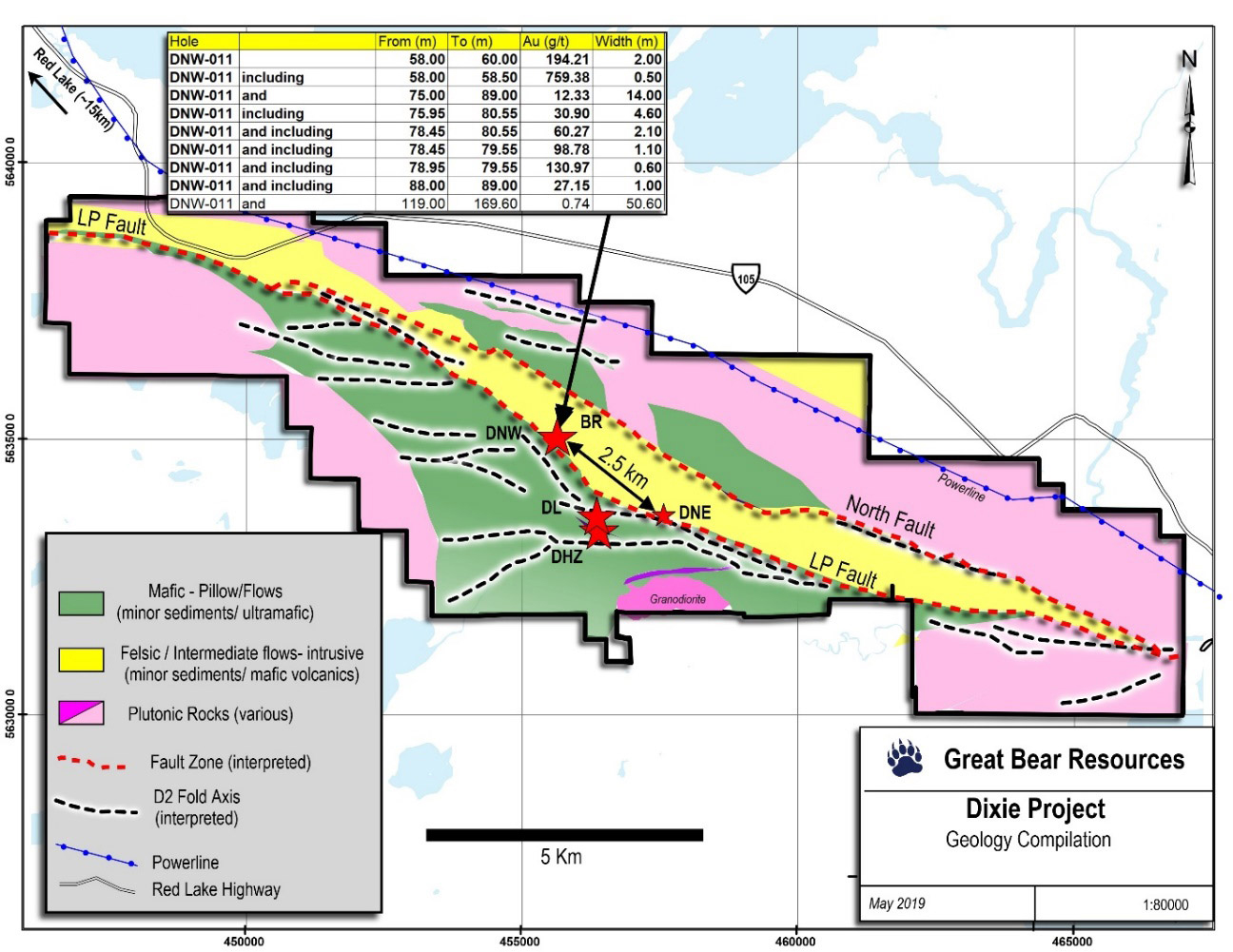
Chris Taylor, President and CEO of Great Bear said, “After recognizing a significant hydrothermal alteration zone in our previous round of regional drilling, we tested and discovered, in our first hole, a new zone of shallow high-grade gold associated with silicification of host rocks related to a crustal-scale structure we call the LP Fault. The fault marks a contact between mafic and felsic/intermediate rocks and is spatially associated with an 80 to 200 metre wide quartz sericite zone associated with highly anomalous to high-grade gold mineralization. We interpret the LP Fault to transect the property for approximately 18 kilometres of strike length. The new Bear-Rimini Zone joins the Hinge Zone as a significant new gold discovery and will be an additional focus of drilling through the remainder of 2019.”
Figure 2: Lithoprobe 3D time travel tomography cross sectional interpretation showing two major crustal-scale structures in the Red Lake district, modified from Zeng and Calvert, 2006. The structure on the right is associated with the main mine trend including Newmont Goldcorp Corp.'s Red Lake Gold Mine. The structure on the left is the LP Fault at Great Bear’s Dixie project.
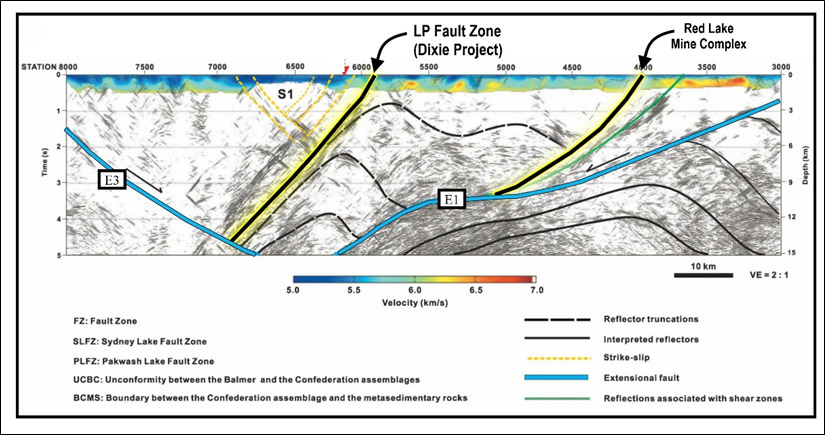
The Bear-Rimini Zone High-Grade Gold Discovery
- The shallowest current gold intercept in DNW-011 is only 53 metres vertically from surface; 759.38 g/t gold over 0.5 metres.
- A finer-scale map showing the location of the Bear-Rimini Zone, other gold zones and significant nearby drill intercepts into the LP Fault, with the location of the cross-section provided in this news release is provided in Figure 3.
- A cross section through the LP Fault and adjacent lithologies is shown on Figure 4.
- Gold in DNW-011 occurs as coarse to fine disseminations with minor accompanying sulphides as shown on Figure 5.
- DNW-011 was drilled from north to south across the quartz sericite zone Great Bear had previously intersected in hole DNW-008 (see news release of May 7, 2019; 34.6 metres of 0.55 g/t gold) and the LP Fault, and intersected two different zones of gold mineralization, which are distinguished by host rock type and proximity to the primary deformation zone within the LP Fault:
- High-grade gold is hosted by strained coarse quartz crystal lapilli tuff units affected by pervasive silica alteration (the “Silicified Zone”) to the north of the LP Fault.
- Anomalous to moderate gold grades are hosted by a “Quartz-Sericite Zone” within and immediately adjacent to the LP Fault, in significantly strained fine quartz crystal tuffs and fine-grained intermediate tuffs.
Figure 3: Close-in view of the LP Fault and Bear-Rimini discovery, showing highlighted drill holes completed across 2.5 kilometres of strike length into the Quartz-Sericite zone. The adjacent Silicified Zone which hosts high-grade gold in DNW-011 is shown extrapolated along strike. A – A’ marks the location of the cross section in Figure 4.
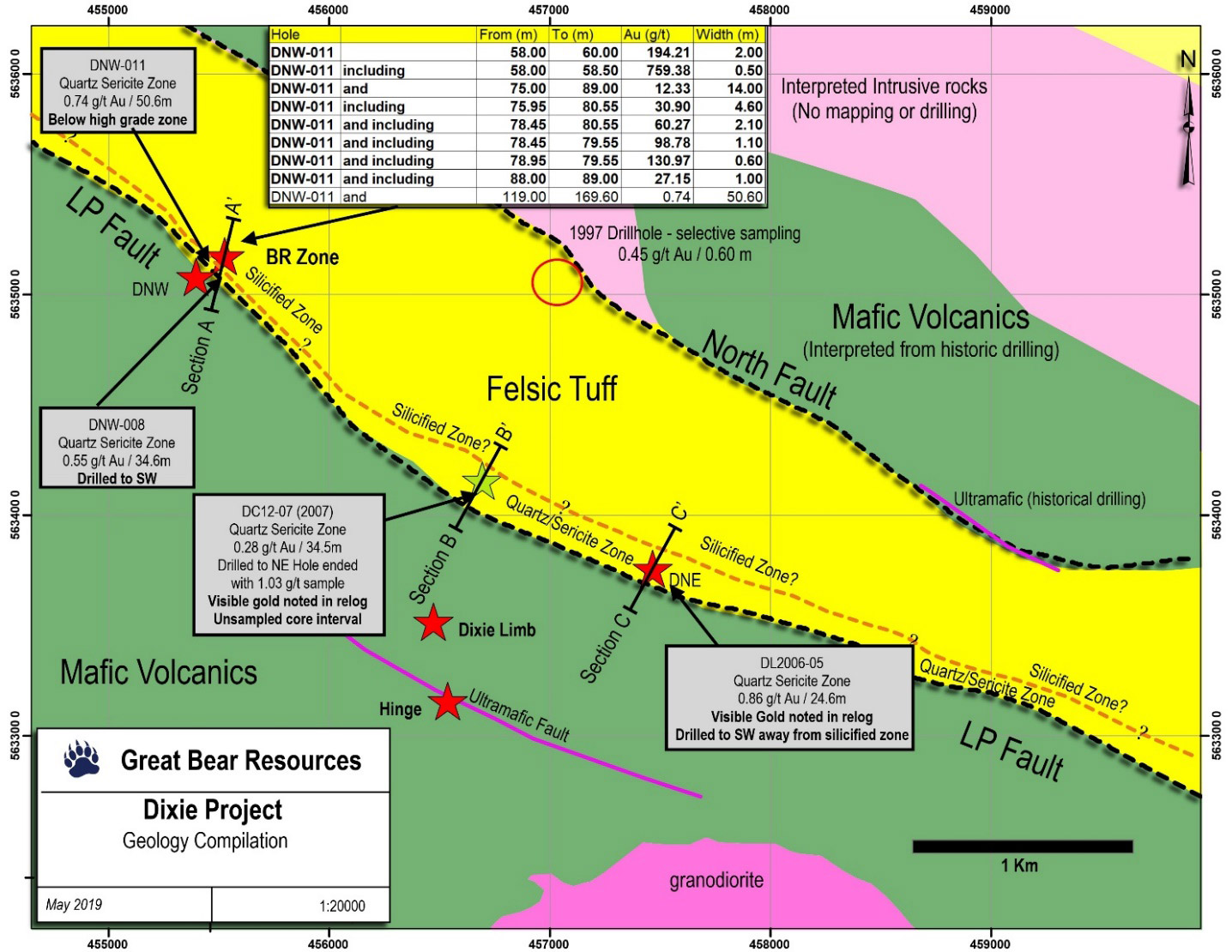
Strike Potential of the Bear-Rimini Zone
- A total of 15 drill holes completed by previous explorers and Great Bear have intersected the Quartz-Sericite Zone along 2.5 kilometres of strike length of the LP Fault. All 15 (100%) of these drill holes encountered anomalous to moderate gold grades matching those observed in the Quartz-Sericite Zone in DNW-011 and DNW-008. Highlighted results are provided in Figure 3.
- These historical drill holes are interpreted to have been drilled south of the Silicified Zone intersected by DNW-011 and stayed entirely within the Quartz-Sericite Zone. The DNE holes drilled closest to the projected Silicified Zone (i.e. furthest north) had higher gold grades, including visible gold in drill core. Up to 80% of the total core length of some historical drill holes were never split and assayed by past explorers. Great Bear is currently re-logging and assaying unsampled mineralized intervals of core from all available historical drill holes from the area.
- While the LP Fault has 18 kilometres of interpreted strike length, the number of mineralized zones that may be hosted by the fault and adjacent units is not yet known, and the structural corridor is not necessarily mineralized along its entire length.
Figure 4: Cross section through Bear-Rimini discovery showing DNW-011, the LP Fault (dashed line) and adjacent lithologies, alteration zones and drill holes.
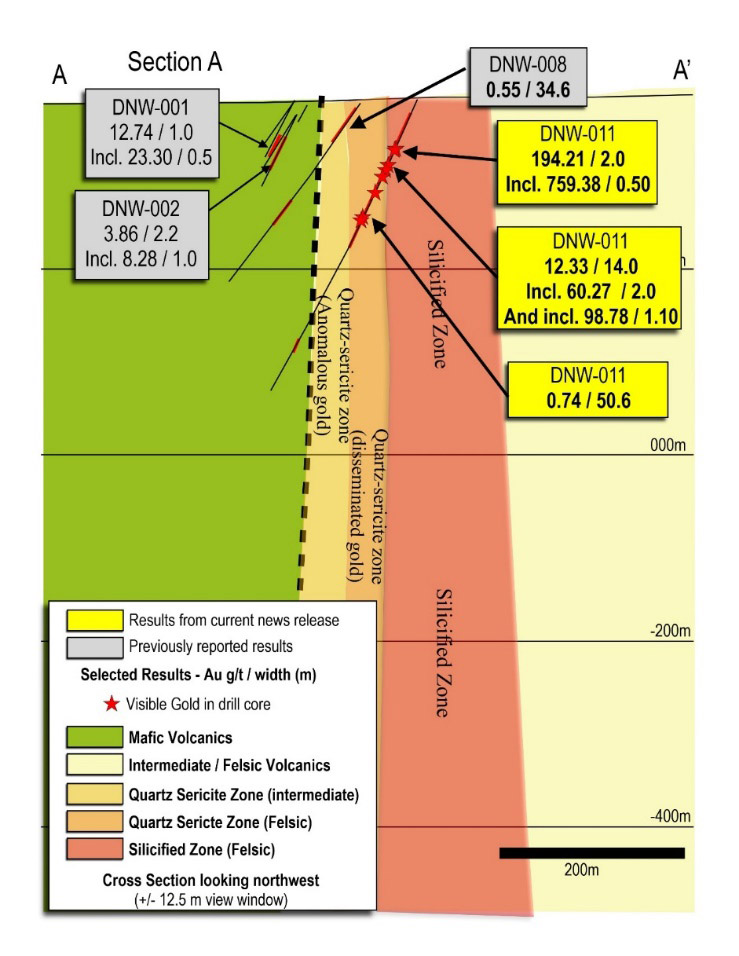
Figure 5: Images of coarse disseminated gold from drill hole DNW-011. Host rock is quartz crystal lapilli tuff in the footwall of the LP Fault. Images from the Silicified Zone. Mineralization depicted in these photos is from two selective intervals and is not necessarily indicative of mineralization on the property.
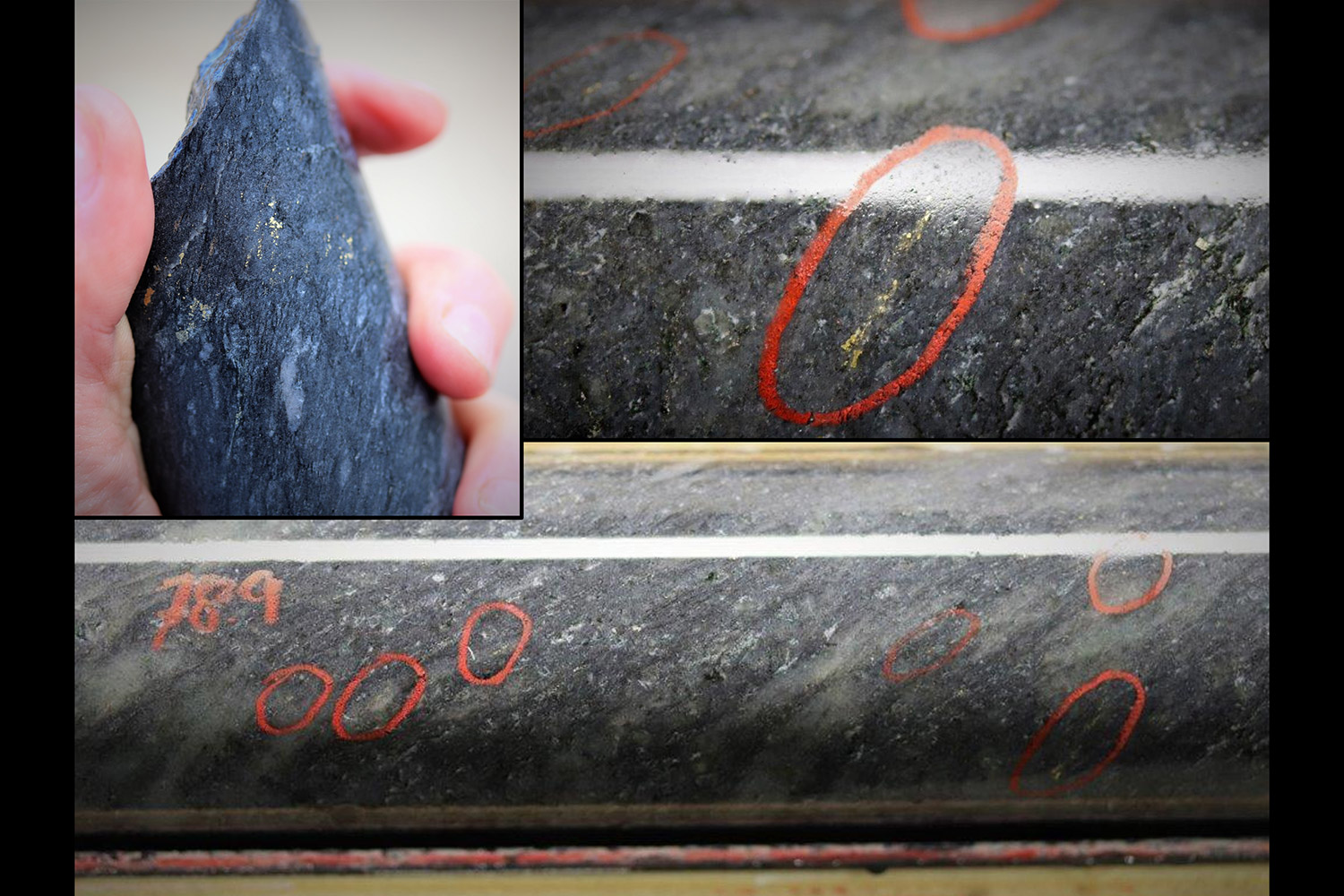
A three-dimensional representation of Great Bear’s model of gold mineralization at the Bear-Rimini discovery as it relates to the 18 kilometre strike length of the LP Fault and other gold zones is provided in Figure 6.
The Company continues to undertake a fully funded, 60,000 metre drill program that is expected to continue through 2019. In order to accelerate the program, a second drill rig was added in early 2019, and a third drill rig is expected in the near future. Approximately 40,000 metres of drilling remain in the current program.
About Great Bear
Great Bear Resources Ltd. (TSX-V: GBR) is a well financed company based in Vancouver, Canada, managed by a team with a track record of success in the mineral exploration sector. Great Bear holds a 100% interest, royalty free, in its flagship Dixie property, which is road accessible year-round via Highway 105, a 15 minute drive from downtown Red Lake, Ontario. The Red Lake mining district is one of the premier mining districts in Canada, benefitting from major active mining operations including the Red Lake Gold Mine of Goldcorp Inc., plus modern infrastructure and a skilled workforce. Production from the Red Lake district does not necessarily reflect the mineralization that may, or may not be hosted on the Company’s Dixie property. The Dixie property covers a drill and geophysically defined multi kilometre gold mineralized structure similar to that associated with other producing gold mines in the district. In addition, Great Bear is also earning a 100% royalty-free interest in the Pakwash, Dedee and Sobel properties, which cover regionally significant gold-controlling structures and prospective geology. All of Great Bear’s Red Lake projects are accessible year-round through existing roads.
Figure 6: Three-dimension model of the LP Fault, showing its interpreted importance during Archean age gold mineralization and various gold zones at the Dixie project. The outline of the block model corresponds to the outline of the Dixie property claims. Bear-Rimini Zone labeled “BR”.
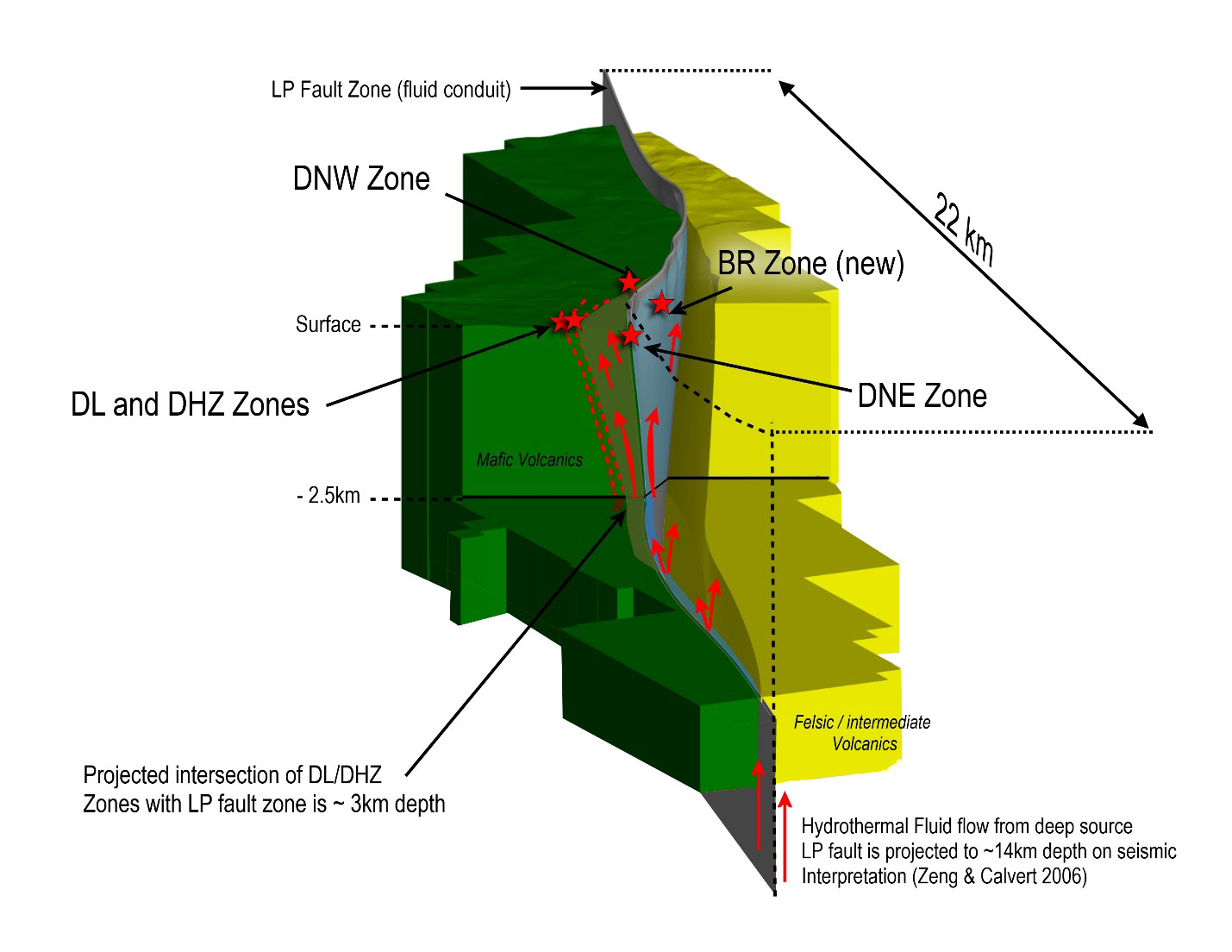
Drill core is logged and sampled in a secure core storage facility located in Red Lake Ontario. Core samples from the program are cut in half, using a diamond cutting saw, and are sent to SGS Canada Inc. in Red Lake, Ontario, and Activation Laboratories in Ancaster Ontario, both of which are accredited mineral analysis laboratories, for analysis. All samples are analysed for gold using standard Fire Assay-AA techniques. Samples returning over 3.0 g/t gold are analysed utilizing standard Fire Assay-Gravimetric methods. Selected samples with visible gold are also analyzed with a standard 1 kg metallic screen fire assay. Certified gold reference standards, blanks and field duplicates are routinely inserted into the sample stream, as part of Great Bear’s quality control/quality assurance program (QAQC). No QAQC issues were noted with the results reported herein.
Mr. R. Bob Singh, P.Geo, Director and VP Exploration, and Ms. Andrea Diakow P.Geo, Exploration Manager for Great Bear are the Qualified Persons as defined by National Instrument 43-101 responsible for the accuracy of technical information contained in this news release.
For further information please contact Mr. Chris Taylor, P.Geo, President and CEO at 604-646-8354, or Mr. Knox Henderson, Investor Relations, at 604-551-2360.
ON BEHALF OF THE BOARD
“Chris Taylor”
Chris Taylor, President and CEO
Inquiries:
Tel: 604-646-8354
Fax: 604-646-4526
| Drill Hole | From (m) | To (m) | Lithology | Gold (g/t) |
| DNW-011 | 12 | 13 | Felsic Lapilli Tuff | 0.059 |
| DNW-011 | 13 | 14 | Felsic Lapilli Tuff | 0.043 |
| DNW-011 | 14 | 14.9 | Felsic Lapilli Tuff | 0.165 |
| DNW-011 | 14.9 | 15.4 | Mafic Dyke | 0.022 |
| DNW-011 | 15.4 | 16.4 | Felsic Lapilli Tuff | 0.475 |
| DNW-011 | 16.4 | 17.4 | Felsic Lapilli Tuff | 0.069 |
| DNW-011 | 17.4 | 18.4 | Felsic Lapilli Tuff | 0.017 |
| DNW-011 | 18.4 | 19.4 | Felsic Lapilli Tuff | 0.006 |
| DNW-011 | 19.4 | 20.4 | Felsic Lapilli Tuff | 0.01 |
| DNW-011 | 20.4 | 20.9 | Felsic Lapilli Tuff | 0.451 |
| DNW-011 | 20.9 | 21.9 | Felsic Lapilli Tuff | 0.005 |
| DNW-011 | 21.9 | 22.9 | Felsic Lapilli Tuff | 0.017 |
| DNW-011 | 22.9 | 24 | Felsic Lapilli Tuff | 0.002 |
| DNW-011 | 24 | 25 | Felsic Lapilli Tuff | 0.002 |
| DNW-011 | 25 | 26 | Felsic Lapilli Tuff | 0.043 |
| DNW-011 | 26 | 27 | Felsic Lapilli Tuff | 0.002 |
| DNW-011 | 27 | 28 | Felsic Lapilli Tuff | 0.023 |
| DNW-011 | 28 | 29 | Felsic Lapilli Tuff | 0.067 |
| DNW-011 | 29 | 30 | Felsic Lapilli Tuff | 0.074 |
| DNW-011 | 30 | 30.5 | Felsic Lapilli Tuff | 1.013 |
| DNW-011 | 30.5 | 31 | Felsic Lapilli Tuff | 0.083 |
| DNW-011 | 31 | 32 | Felsic Lapilli Tuff | 0.156 |
| DNW-011 | 32 | 33 | Felsic Lapilli Tuff | 0.069 |
| DNW-011 | 33 | 34 | Felsic Lapilli Tuff | 0.028 |
| DNW-011 | 34 | 35 | Felsic Lapilli Tuff | 0.032 |
| DNW-011 | 35 | 36 | Felsic Lapilli Tuff | 0.025 |
| DNW-011 | 36 | 37 | Felsic Lapilli Tuff | 0.055 |
| DNW-011 | 37 | 37.8 | Felsic Lapilli Tuff | 0.023 |
| DNW-011 | 37.8 | 38.45 | Felsic Lapilli Tuff | 0.007 |
| DNW-011 | 38.45 | 39 | Felsic Lapilli Tuff | 0.012 |
| DNW-011 | 39 | 39.5 | Felsic Lapilli Tuff | 0.016 |
| DNW-011 | 39.5 | 40 | Felsic Lapilli Tuff | 0.013 |
| DNW-011 | 40 | 40.5 | Felsic Lapilli Tuff | 0.138 |
| DNW-011 | 40.5 | 41 | Felsic Lapilli Tuff | 0.008 |
| DNW-011 | 41 | 42 | Mafic Dyke | 0.012 |
| DNW-011 | 42 | 43 | Felsic Lapilli Tuff | 0.042 |
| DNW-011 | 43 | 44 | Felsic Lapilli Tuff | 0.282 |
| DNW-011 | 44 | 45 | Felsic Lapilli Tuff | 0.148 |
| DNW-011 | 45 | 46 | Felsic Lapilli Tuff | 0.027 |
| DNW-011 | 46 | 47 | Felsic Lapilli Tuff | 0.014 |
| DNW-011 | 47 | 48 | Felsic Lapilli Tuff | 0.121 |
| DNW-011 | 48 | 49 | Felsic Lapilli Tuff | 0.023 |
| DNW-011 | 49 | 50 | Felsic Lapilli Tuff | 0.046 |
| DNW-011 | 50 | 51 | Felsic Lapilli Tuff | 0.039 |
| DNW-011 | 51 | 52 | Mafic Dyke | 0.05 |
| DNW-011 | 52 | 53 | Mafic Dyke | 0.002 |
| DNW-011 | 53 | 54 | Mafic Dyke | 0.006 |
| DNW-011 | 54 | 55 | Mafic Dyke | 0.013 |
| DNW-011 | 55 | 55.5 | Mafic Dyke | 0.38 |
| DNW-011 | 55.5 | 56.5 | Felsic Lapilli Tuff | 0.015 |
| DNW-011 | 56.5 | 57 | Felsic Lapilli Tuff | 0.016 |
| DNW-011 | 57 | 57.5 | Felsic Lapilli Tuff | 0.022 |
| DNW-011 | 57.5 | 58 | Felsic Lapilli Tuff | 0.128 |
| DNW-011 | 58 | 58.5 | Felsic Lapilli Tuff | 759.38 |
| DNW-011 | 58.5 | 59 | Felsic Lapilli Tuff | 2.247 |
| DNW-011 | 59 | 60 | Felsic Lapilli Tuff | 7.598 |
| DNW-011 | 60 | 60.5 | Felsic Lapilli Tuff | 0.027 |
| DNW-011 | 60.5 | 61 | Felsic Lapilli Tuff | 0.061 |
| DNW-011 | 61 | 62 | Felsic Lapilli Tuff | 0.246 |
| DNW-011 | 62 | 63 | Felsic Lapilli Tuff | 0.054 |
| DNW-011 | 63 | 63.5 | Felsic Lapilli Tuff | 0.098 |
| DNW-011 | 63.5 | 64 | Felsic Lapilli Tuff | 0.013 |
| DNW-011 | 64 | 65 | Felsic Lapilli Tuff | 0.022 |
| DNW-011 | 65 | 65.5 | Felsic Lapilli Tuff | 0.03 |
| DNW-011 | 65.5 | 66 | Felsic Lapilli Tuff | 0.002 |
| DNW-011 | 66 | 67 | Quartz Vein | 0.033 |
| DNW-011 | 67 | 68 | Felsic Lapilli Tuff | 0.002 |
| DNW-011 | 68 | 68.5 | Felsic Lapilli Tuff | 0.024 |
| DNW-011 | 68.5 | 69 | Felsic Lapilli Tuff | 0.009 |
| DNW-011 | 69 | 69.5 | Felsic Lapilli Tuff | 0.012 |
| DNW-011 | 69.5 | 70.5 | Felsic Lapilli Tuff | 0.023 |
| DNW-011 | 70.5 | 71.5 | Felsic Lapilli Tuff | 0.027 |
| DNW-011 | 71.5 | 72.5 | Felsic Lapilli Tuff | 0.029 |
| DNW-011 | 72.5 | 73.5 | Felsic Lapilli Tuff | 0.679 |
| DNW-011 | 73.5 | 74 | Felsic Lapilli Tuff | 0.084 |
| DNW-011 | 74 | 74.5 | Felsic Lapilli Tuff | 0.073 |
| DNW-011 | 74.5 | 75 | Felsic Lapilli Tuff | 0.085 |
| DNW-011 | 75 | 75.95 | Felsic Lapilli Tuff | 1.702 |
| DNW-011 | 75.95 | 76.45 | Felsic Lapilli Tuff | 19.33 |
| DNW-011 | 76.45 | 76.95 | Felsic Lapilli Tuff | 2.186 |
| DNW-011 | 76.95 | 77.45 | Felsic Lapilli Tuff | 1.16 |
| DNW-011 | 77.45 | 77.95 | Felsic Lapilli Tuff | 7.311 |
| DNW-011 | 77.95 | 78.45 | Felsic Lapilli Tuff | 1.177 |
| DNW-011 | 78.45 | 78.95 | Felsic Lapilli Tuff | 60.15 |
| DNW-011 | 78.95 | 79.55 | Felsic Lapilli Tuff | 130.97 |
| DNW-011 | 79.55 | 80.05 | Felsic Lapilli Tuff | 25.99 |
| DNW-011 | 80.05 | 80.55 | Quartz Vein | 9.829 |
| DNW-011 | 80.55 | 81.05 | Felsic Lapilli Tuff | 0.391 |
| DNW-011 | 81.05 | 82 | Felsic Lapilli Tuff | 0.236 |
| DNW-011 | 82 | 83 | Felsic Lapilli Tuff | 0.195 |
| DNW-011 | 83 | 84 | Felsic Lapilli Tuff | 0.074 |
| DNW-011 | 84 | 85 | Felsic Lapilli Tuff | 0.164 |
| DNW-011 | 85 | 86 | Felsic Lapilli Tuff | 0.522 |
| DNW-011 | 86 | 87 | Felsic Lapilli Tuff | 0.134 |
| DNW-011 | 87 | 88 | Felsic Lapilli Tuff | 0.224 |
| DNW-011 | 88 | 89 | Felsic Lapilli Tuff | 27.15 |
| DNW-011 | 89 | 90 | Felsic Lapilli Tuff | 0.075 |
| DNW-011 | 90 | 91 | Felsic Lapilli Tuff | 0.048 |
| DNW-011 | 91 | 92 | Felsic Lapilli Tuff | 0.02 |
| DNW-011 | 92 | 93 | Felsic Lapilli Tuff | 0.249 |
| DNW-011 | 93 | 94 | Felsic Lapilli Tuff | 0.024 |
| DNW-011 | 94 | 95 | Felsic Lapilli Tuff | 0.035 |
| DNW-011 | 95 | 96 | Felsic Lapilli Tuff | 0.036 |
| DNW-011 | 96 | 97 | Felsic Lapilli Tuff | 0.054 |
| DNW-011 | 97 | 98 | Felsic Lapilli Tuff | 0.04 |
| DNW-011 | 98 | 98.8 | Felsic Lapilli Tuff | 0.162 |
| DNW-011 | 98.8 | 99.3 | Felsic Lapilli Tuff | 0.009 |
| DNW-011 | 99.3 | 100.3 | Felsic Lapilli Tuff | 0.137 |
| DNW-011 | 100.3 | 101.3 | Felsic Lapilli Tuff | 0.18 |
| DNW-011 | 101.3 | 102 | Felsic Lapilli Tuff | 0.068 |
| DNW-011 | 102 | 103 | Felsic Lapilli Tuff | 0.126 |
| DNW-011 | 103 | 104 | Felsic Lapilli Tuff | 0.207 |
| DNW-011 | 104 | 105 | Felsic Lapilli Tuff | 0.199 |
| DNW-011 | 105 | 105.9 | Felsic Lapilli Tuff | 0.126 |
| DNW-011 | 105.9 | 107.2 | Mafic Dyke | 0.734 |
| DNW-011 | 107.2 | 107.7 | Mafic Dyke | 0.069 |
| DNW-011 | 107.7 | 108.2 | Quartz Vein | 0.036 |
| DNW-011 | 108.2 | 108.7 | Quartz Vein | 0.006 |
| DNW-011 | 108.7 | 109.2 | Quartz Vein | 0.028 |
| DNW-011 | 109.2 | 109.7 | Quartz Vein | 0.066 |
| DNW-011 | 109.7 | 110.2 | Quartz Vein | 1.746 |
| DNW-011 | 110.2 | 111 | Quartz Vein | 0.329 |
| DNW-011 | 111 | 111.95 | Felsic Lapilli Tuff | 0.679 |
| DNW-011 | 111.95 | 112.25 | Intermediate Tuff | 0.087 |
| DNW-011 | 112.25 | 112.8 | Felsic Lapilli Tuff | 0.027 |
| DNW-011 | 112.8 | 114 | intermediate tuff | 0.417 |
| DNW-011 | 114 | 115 | intermediate tuff | 0.375 |
| DNW-011 | 115 | 116.1 | intermediate tuff | 0.183 |
| DNW-011 | 116.1 | 117 | intermediate tuff | 0.024 |
| DNW-011 | 117 | 118 | Felsic Lapilli Tuff | 0.018 |
| DNW-011 | 118 | 119 | Felsic Lapilli Tuff | 0.076 |
| DNW-011 | 119 | 120 | Felsic Lapilli Tuff | 0.521 |
| DNW-011 | 120 | 121 | Felsic Lapilli Tuff | 0.189 |
| DNW-011 | 121 | 122 | Felsic Lapilli Tuff | 0.913 |
| DNW-011 | 122 | 123 | Felsic Lapilli Tuff | 0.042 |
| DNW-011 | 123 | 124 | Felsic Lapilli Tuff | 0.106 |
| DNW-011 | 124 | 125 | Felsic Lapilli Tuff | 0.054 |
| DNW-011 | 125 | 126 | Felsic Lapilli Tuff | 0.027 |
| DNW-011 | 126 | 127 | Felsic Lapilli Tuff | 0.149 |
| DNW-011 | 127 | 127.95 | Felsic Lapilli Tuff | 0.135 |
| DNW-011 | 127.95 | 129 | Mafic Tuff | 1.239 |
| DNW-011 | 129 | 130 | Mafic Tuff | 2.959 |
| DNW-011 | 130 | 131 | Mafic Tuff | 1.042 |
| DNW-011 | 131 | 132 | Mafic Tuff | 0.601 |
| DNW-011 | 132 | 133 | Mafic Tuff | 0.564 |
| DNW-011 | 133 | 134.05 | Mafic Tuff | 0.871 |
| DNW-011 | 134.05 | 134.65 | Mafic Tuff | 2.136 |
| DNW-011 | 134.65 | 135.65 | Intermediate Tuff | 0.524 |
| DNW-011 | 135.65 | 136.85 | Intermediate Tuff | 2.658 |
| DNW-011 | 136.85 | 138 | Intermediate Tuff | 1.179 |
| DNW-011 | 138 | 139 | Felsic Tuff | 0.622 |
| DNW-011 | 139 | 139.75 | Felsic Tuff | 0.745 |
| DNW-011 | 139.75 | 140.25 | Felsic Tuff | 2.833 |
| DNW-011 | 140.25 | 140.75 | Felsic Tuff | 0.371 |
| DNW-011 | 140.75 | 141.25 | Felsic Tuff | 1.222 |
| DNW-011 | 141.25 | 141.75 | Felsic Tuff | 2.115 |
| DNW-011 | 141.75 | 142.25 | Felsic Tuff | 1.644 |
| DNW-011 | 142.25 | 142.75 | Felsic Tuff | 0.453 |
| DNW-011 | 142.75 | 143.25 | Felsic Lapilli Tuff | 0.904 |
| DNW-011 | 143.25 | 144.1 | Felsic Lapilli Tuff | 0.924 |
| DNW-011 | 144.1 | 145 | Felsic Lapilli Tuff | 0.349 |
| DNW-011 | 145 | 146 | Felsic Tuff | 0.154 |
| DNW-011 | 146 | 147 | Felsic Tuff | 0.295 |
| DNW-011 | 147 | 147.85 | Felsic Tuff | 0.135 |
| DNW-011 | 147.85 | 148.15 | Felsic Lapilli Tuff | 0.055 |
| DNW-011 | 148.15 | 149.65 | Felsic Lapilli Tuff | 0.049 |
| DNW-011 | 149.65 | 150.15 | Felsic Lapilli Tuff | 0.002 |
| DNW-011 | 150.15 | 151 | Felsic Lapilli Tuff | 0.214 |
| DNW-011 | 151 | 152.25 | Felsic Tuff | 0.196 |
| DNW-011 | 152.25 | 153 | Felsic Lapilli Tuff | 0.214 |
| DNW-011 | 153 | 154 | Felsic Lapilli Tuff | 0.456 |
| DNW-011 | 154 | 155 | Felsic Tuff | 2.454 |
| DNW-011 | 155 | 156 | Felsic Tuff | 0.33 |
| DNW-011 | 156 | 156.65 | Felsic Tuff | 0.237 |
| DNW-011 | 156.65 | 157.65 | Felsic Lapilli Tuff | 1.911 |
| DNW-011 | 157.65 | 158.65 | Felsic Lapilli Tuff | 0.365 |
| DNW-011 | 158.65 | 159.65 | Felsic Lapilli Tuff | 0.597 |
| DNW-011 | 159.65 | 160.65 | Felsic Lapilli Tuff | 2.042 |
| DNW-011 | 160.65 | 161.5 | Felsic Lapilli Tuff | 0.266 |
| DNW-011 | 161.5 | 162.5 | Felsic Lapilli Tuff | 0.123 |
| DNW-011 | 162.5 | 163.5 | Felsic Tuff | 0.04 |
| DNW-011 | 163.5 | 164.5 | Felsic Tuff | 0.053 |
| DNW-011 | 164.5 | 165.65 | Felsic Tuff | 0.181 |
| DNW-011 | 165.65 | 166.15 | Felsic Lapilli Tuff | 0.061 |
| DNW-011 | 166.15 | 167 | Felsic Lapilli Tuff | 0.268 |
| DNW-011 | 167 | 168 | Felsic Tuff | 0.155 |
| DNW-011 | 168 | 168.6 | Mafic Dyke | 6.391 |
| DNW-011 | 168.6 | 169.6 | Felsic Tuff | 0.141 |
Neither TSX Venture Exchange nor its Regulation Services Provider (as that term is defined in the policies of the TSX Venture Exchange) accepts responsibility for the adequacy or accuracy of this release.
This new release may contain forward-looking statements. These statements are based on current expectations and assumptions that are subject to risks and uncertainties. Actual results could differ materially because of factors discussed in the management discussion and analysis section of our interim and most recent annual financial statement or other reports and filings with the TSX Venture Exchange and applicable Canadian securities regulations. We do not assume any obligation to update any forward-looking statements.
We seek safe harbor

